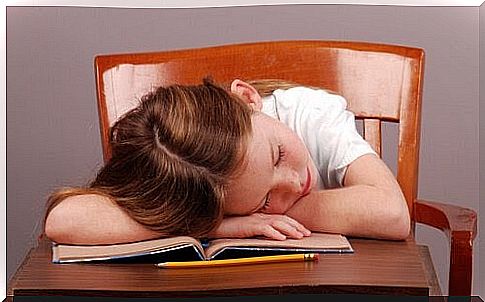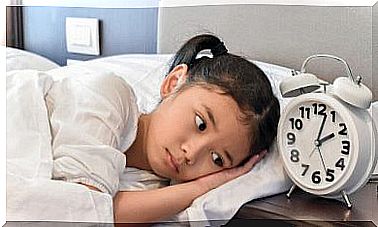Children Who Sleep Too Little Get Sick More Easily

The relationship between lack of sleep and various diseases is clear. With children, it can also be created by poor sleep habits. Keep reading to learn why children who sleep a little too easily get sick.
Routine is an essential part of sleep, as it is proven that children who go to bed late suffer from more diseases. From an early age, poor sleep habits are established.
Lack of sleep affects us all, but during childhood it takes more time to recover energy and recover than it does for adults. It is not the same for a newborn and an adult.
Number of hours of sleep by age
The difference in the amount of sleep required for different age groups is important. As we grow, we go from sleeping between 14-17 hours to only 7-8 hours as an adult. At the same time, school-age children need an average of 10-12 hours of sleep.
Of course, there will be certain periods when these needs change. The important thing is to respect sleeping habits and individual needs as much as possible.
This is how many hours of sleep children need, calculated by age:
- Newborns up to 12 months: 11-14 hours per day is recommended.
- Up to five years: between 10 and 13 hours per night.
- Five to 13 years: between nine and eleven hours per night.
- 13-17 years old: between eight and 10 hours per night.

Why do children who sleep too little suffer from more diseases?
Many diseases start with lack of sleep or poor sleep habits. When we allow children to go to bed late, we can increase the risk of the following conditions:
- Insomnia: Due to their lack of good sleep hygiene, children do not internalize sleep patterns that lead to high-quality rest and recovery. For this reason, it leads to them going to bed late, to an easier and more restless sleep, where they often wake up and as a result have a lack of rest.
- Fatigue and exhaustion in childhood: If you do not respect the number of hours of sleep the child needs, the child becomes more and more tired. Children can wake up at the same time every day on school days, but it can vary on weekends. In both cases, children can not maintain stable daily and nocturnal routines, because they have not had enough rest.
- Apathy: Children who have this disease experience a condition similar to depression. They do not feel like doing anything, nor do they show interest in the world around them. Their emotional state is affected by constant low energy, making them more isolated.
- Anxiety: Lack of consistent rest can cause mood swings and anxiety problems. Thoughts that cause anxiety arise or are aggravated by lack of sleep.
Advice for bedtime
As long as normal sleep patterns are maintained, a child can sometimes stay up late. The point is not to establish a strict schedule with no exceptions at all, but rather to be flexible where appropriate.

Your child should be able to understand when a situation is an exception, and when he must adhere to the daily schedule. For advice that will help guide them in learning good sleeping habits, consider the following:
Useful habits for children who sleep too little
- A predictable schedule: you go to bed at one time and go up on another. You and your child can create a schedule that can always be available as a frame of reference.
- A peaceful environment: the child’s bedroom should be dedicated to rest and relaxation. Try to avoid distracting factors such as video or computer games. Your child needs his room to use it specifically for sleep.
- Preparations for bedtime before you go to bed, your child should be allowed to stay in a relaxing environment. Avoid too much stimulation through mischief, wild games and movies or video games. For this purpose, encourage them to read or listen to relaxing music.
- Regular conversation: Anything that worries your child will stay with them when it’s time to go to bed. For this reason, it is recommended that you talk about anything that may occupy their thoughts, allowing them to have a relaxed mood when it is time for bed.
- Monitor your nutritional intake: It is important to pay attention to what your child eats. Some foods stimulate them, which can interfere with a normal sleep schedule.
In conclusion, you need to pay as much attention to your child’s sleep routine as you do to their diet or studies. In the long run, children who sleep too little suffer from consequences that go beyond their mood and performance in daily activities.









